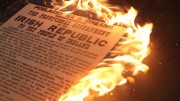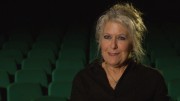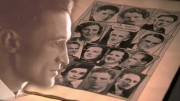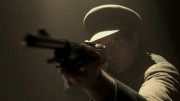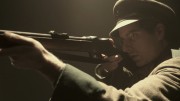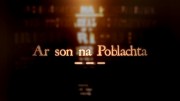The first programme of this new RTÉ Cláracha Gaeilge series AR SON NA POBLACHTA – tells the story of Arthur Shields.
Arthur Shields is better known as a character actor in a slew of Hollywood Movies, many classic American TV shows. He is remembered for his theatre career both as actor and director with The Abbey and as the younger brother of Will Shields the Oscar winning actor “Barry Fitzgerald”, but hardly ever for the dramatic and valiant way he fought in the Rising in 1916!
“I remember always hearing that the Shields family were always just one step ahead of the Sheriff. He came from a very socialist, idealistic, poor family and they were always having to get out and flit from one place to another” Susan Slott – Actor & Grand Niece
Arthur was born into a Church of Ireland family, by the Grand Canal in Portobello, Dublin, 20 years before the 1916 Rising. His family moved frequently and eventually settled in Clontarf on the Northside of the City. His father was a prominent member of the political left – a free thinker and an avowed socialist & pacifist.
“Ba mhuintir an spéisiuil iad na Shields, mar muintir as an gnáth a bhí iontú. Ba as an nGearmáin a mhathair, mar shampla. A athair, Adolphus Shields, sosialaigh a bhí ann agus ceard chumanaigh, duine do cheann ródaí na heite chlé i mBaile Átha Cliath agus iriseoir a bhí ann…an cineáil soisialachas a bhí ag Adolphus Shields – bhain sé le dream a tugadh na Fabians orthu – bhí siad ag iarraidh athrú a dhéanamh ar chúrsaí soisialta ach níor chreid siad i Réabhlóid ná Foréigin ná aon rud mar sin…. Bhí baint aige le Séamus Ó Conghnaile a thabhairt go hÉireann. “
Aindrias Ó Cathasaigh
Arthur’s German mother Fanny Ungerland had emigrated to Scotland bridling against her conservative “well to do” Hamburg family’s restrictions on the freedom of their daughters. She met Adolphus Shields while on a trip to Dublin and they went on to have seven children together. Every child was encouraged to develop their natural talents. Arthur’s formal schooling was patchy due to the frequent moves and money being short. But Shields as a great reader, particularly of Irish and Russian authors, and his passion for drama helped to compensate. He was from an early age involved in putting on plays and attended drama classes at The Abbey from 1913.
“The revolutionary movement to a certain extent comes out of a wider cultural movement and if you look at the amateur theatre groups in the decade before 1916 or even if you look at what the Abbey Theatre is doing – they’re constantly enacting on stage – revolution! The really big popular plays like Cathleen Ní Houlihan are really a sort of propaganda, raising nationalist consciousness.“
Dr. Feargal McGarry QUB
“I’ve had trouble indeed …Too many strangers in the house…My Land was taken from me… My four beautiful green fields” Cathleen Ní Houlihan (Yeats/Gregory)
Arthur, influenced very much by the Yeats/Gregory play Cathleen Ní Houlihan and despite his father’s pacifist beliefs, joined the Irish Volunteers in the wake of the 1914 Howth Gun Running and the Battle of Bachelor’s Walk.
“The number of people that you find both in the physical force movement and in Irish Theatre who in their memoirs say – you know my life was changed when I first saw Cathleen Ní Houlihan – which is a 15 minute play, half written by Lady Gregory, the idea was from Yeats. It’s a very simple, rabble rousing propaganda play. “ Prof Adrian Frazier NUIG
“I knew one time, yellow-haired Donough that was hanged in Galway….. He died for love of me: many a man has died for love of me.” Cathleen Ní Houlihan (Yeats/Gregory)
“It was a life changing event for a lot of people. In that you should give your whole life – everything – to this one cause. Shields was one of those as well. It was like a Road to Damascus experience for a lot of people. “ Prof Adrian Frazier NUIG
Arthur was getting parts in Abbey Productions and all the while, with his friend Charlie Saurin, trained regularly with F Company of the Volunteers.
“I think what’s quite unusual about Arthur is not that he joins the Irish Volunteers – because huge numbers of young men joined the volunteers in this period particularly in Dublin. What’s unusual is that he sticks around after the split in the summer of 1914 when John Redmond backed the war (WWI). At that point the Irish Volunteers are really reduced down to 5% of its membership. from 150,000 down to maybe 5,000 or 10,000 men and the other thing that’s unusual about Arthur is that he turns out for the Easter Rising itself. Because only a small proportion of the Irish Volunteer membership, even within the radical group, actually turned out on Sunday and Easter Monday. So in that sense, he clearly has a commitment to the rebellion.“
Dr. Feargal McGarry QUB
The confusion caused by Eoin Mac Neill’s countermanding orders cancelling the volunteers mustering on Easter Sunday was played out with Arthur and Charlie turning up at Fairview on the Sunday and again on the Monday. When it was clear that a rebellion was afoot, Arthur had to go the the city centre where he’d stashed his rifle under the Abbey stage, rather than at home where his father Adolphus wouldn’t allow it. Once in the city, Arthur, now armed, reported for duty to James Connolly around the corner at Liberty Hall and became part of the garrison that took over the GPO. Arthur’s Easter Week was spent in various outposts on and around Sackville Street and the GPO. In the heart of the battle to defend the HQ of the newly proclaimed Republic. To the final surrender, Arthur Shields was part of the retreating volunteers that were forced to abandon the GPO and who fought and dug their way down along Moore Street. The violence of Easter Week and all that followed for Arthur is dramatic. His story and the ideals that motivated his involvement, which he felt were never realised, gives a very different insight into the foundation story of our Republic.
“It’s the stuff of movies…he was a movie star … that he never wanted to make that story and put it on film is astonishing… “ Prof Adrian Frazier NUIG
Reporter / Presenter : PADRAIG O’DRISCOLL
Director & Executive Producer: KEVIN CUMMINS
AR SON NA POBLACHTA
RTÉ Cláracha Gaeilge ag comóradh Éirí Amach 1916
RTÉ One 19.30 ag tosú 18ú Eanair 2016.
Ar Son Na Poblachta is part of Ireland 1916
